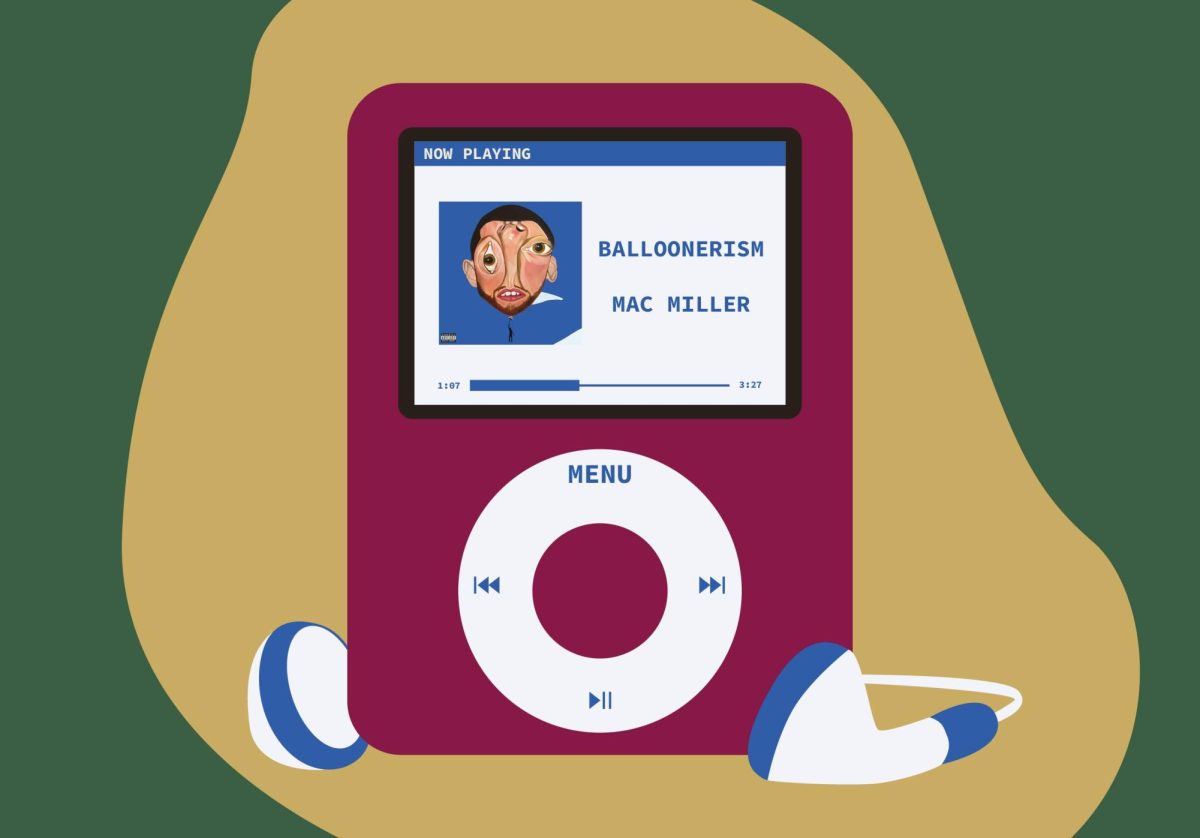Released Jan. 17, two days before what would have been Mac Miller’s 33rd birthday, “Balloonerism” reveals the relationship between a man and death.
Addiction is a key theme throughout “Balloonerism.” The album is dark and tragic knowing he died of an accidental overdose in 2018.
However, Miller approached this album with awareness of the negative effects of addiction while validating his own experience.
Fans have long speculated about “Balloonerism” after various tracks leaked since Miller recorded it in 2014, according to Forbes. Miller said the album was important to him before his death, Miller’s estate said on Instagram.
The album opens with “Tambourine Dream,” 30 seconds of what sounds like someone casually playing with a tambourine. It sets the tone for an innately human and real album.
In collaboration with SZA, “DJ’s Chord Organ” has an idyllic and heavenly sound juxtaposed by lyrics explaining a loss of Identity, leading to dizzying exhaustion and ultimately substance abuse.
“Cocaine is ruthless/I know the truth about it/Cocaine is ruthless,” SZA sings.
The repetition of the lyrics throughout the song resembles the feeling of being stuck in a cycle.
In “5 Dollar Pony Rides,” the lead single off the album, Miller repeatedly asks, “Can I give you what you want/Can I give you what you need?”
Miller sounds soulful while talking about the struggle of relationship and intimacy when two people deal with mental illness. Miller expresses the frustrations of a dead-end relationship and the inability to leave due to past connection.
“Girl, you wastin’ my time, and I am wastin’ your time, but that’s okay,” Miller sings.
Tracks “Mrs. Deborah Downer” and “Shangri-La” describe relationships with drugs and fame. Miller validates the choice of addiction given the state of the world. He admits nothing in the industry is as it seems with the simple lyric “Just how super is a supermodel?” in “Shangri-La.”
“Funny Papers” is a track full of commentary on witnessing life and death in the “funny papers.” The news fatigue is delivered with piano and a soft beat, letting the lyrics stand out. This is my favorite track on the album because the topic is something everyone can relate to.
“Excelsior” is a short, stand-out track dripping with nostalgia. In addition to this track, there is a short film on Amazon Prime with the same title as the album.
Miller discusses orphan children playing on a playground and introduces the characters Johnny, Claire, Timmy, and Max. The film follows these children as they experience a life-altering loss of innocence.
Miller yearns for youthful ignorance when he raps, “Whatever happened to apple juice and cartwheels?” He explains a melancholy in the limitations and “brainwash” of the adult world to a mellow beat and children playing in the background.
A telling lyric that stood out to me was, “Me, I used to want to be a wizard,”
Miller voices the thoughts we all feel at one point or another. The final tracks on the album are when Miller wrestles with the concept of death the most, and his lyricism reveals an awareness his substance abuse will eventually be the thing that kills him.
“But what can we do? What can we do?/’Cause I see the light at the end of the tunnel,” Miller sings on “Manakins.”
The answers to Miller’s questions cannot be found in the tangible world, and he looks to death as being a release. The title “Balloonerism” enables a tone of wandering and journey. From start to finish, Miller journeys through life’s ups and downs in this album. He is constantly aware death is inevitable.
Overall, this album acts as a warning of the dangers of fame, addiction and mental illness. Miller humanizes his own experience with his impeccable and persistent acknowledgment that his addiction is killing him.
The album is as poetic as it is tragic, and the casual but forward approach makes this album worth a listen.














